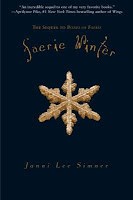 |
| Janni in Iceland |
“Blood doesn’t taste coppery, you know.”
I don’t remember who said that to me, but I do remember my response, an indignant, “Of course it does!”
I knew well enough what blood tasted like. (Doesn’t everyone?)
Besides, I’d read enough descriptions of coppery-tasting blood through the years. That many writers couldn’t all be wrong.
My friend–I think it was a friend–was unconvinced. There was only one way to resolve the question. I dug through my pocket, found a particularly clean penny, and tasted it.
It turns out a penny tastes nothing like blood. Not because I was wrong about what blood tastes like, but because I was wrong about what copper tastes like.
 I was so sure I already knew that I’d never actually done my research.
I was so sure I already knew that I’d never actually done my research.
Some people think that research is limited to realistic novels, because fantasy writers are “just making stuff up.” Writing magic isn’t as simple as making things up, of course, and how to write magic well could be the subject of a post of its own.
But fantasy stories aren’t just about magic. The most fantastical stories are filled with countless realistic details that require research.
In a way, contemporary fiction writers are at an advantage. They live in the world they’re writing in and so already know many of its details. Most of us don’t have to look up how to turn on a stove and put dinner in the oven, after all, but building a fire and cooking over the flames–that might require research. (That research will tell you that open flames often aren’t as good for cooking as the hot coals that follow them are.)
Things I researched for my magical, post-apocalyptic Bones of Faerie trilogy (Bones of Faerie, Faerie Winter and Faerie After) include Missouri plants and trees, styles of hunting bows, how many people a woodchuck feeds, how to set a broken leg, how to make rope, how to card wool, wolf behavior, radiation poisoning … the list goes on and on.
Even though I’d lived in St. Louis for eight years, I also returned to the city to remind myself of its (pre-apocalyptic) geography and to retrace the routes my characters would follow. (See photos from that trip.)
I went hiking and took notes about the local vegetation, too, because field guides can tell you what plants are present, but not which vines most often overgrow the trail or how the sun slants through the trees.
Once I was home, I kept in touch with St. Louis friends, emailing them questions about the colors of autumn leaves and when winter really began. And before each book of the trilogy went to copyediting, I checked and rechecked the phases of the moon, making sure the moonrise and moonset happened at the right times and that my characters weren’t trekking by moonlight that wasn’t there.
I did even more research for Thief Eyes, my standalone fantasy novel set in Iceland, because I hadn’t spent eight years living there. I took two trips to Iceland, one to find the story and one to work out all the details. I also made a separate trip to Seaworld San Diego to meet an arctic fox up close. (See trip reports and photos from my second Iceland trip and video from my arctic fox encounter.)
I didn’t have to do much moon research for that book, but I did need to know that the sun barely sets in summer. I needed to know what it felt like, to wake up in the middle of the night with the sun cheerfully shining through your window, too.
 |
| Janni’s research assistant, the arctic fox |
Would my readers have noticed if I let the wrong trees grow in post-apocalyptic St. Louis or if I misrepresented the feel of an arctic fox’s fur? Those who know about those details would have. Maybe that’s only a handful of readers, but each missed detail is a chance to throw a few more readers out of the story–while each detail I get right is a chance to win more readers over.
 |
| Iceland |
As fantasy writers we ask a lot of our readers. We ask them to suspend disbelief and accept impossible things, at least for the duration of the story. If I get the details of how to build a cooking fire wrong, those readers who’ve built cooking fires will trust me a little bit less.
If I’m clearly making up even the true things, why should they take my word about the untrue ones?
 |
| Missouri forest |
It’s in part because I’m a fantasy writer that I want the glow of the coals and the sting of smoke in the eyes and yes, even the taste of blood, to feel real and true.
If these things feel real, it increases the chances that when I go on to say things like “Ever since the War with Faerie destroyed the world …” that will feel real and true, too–real enough that readers will nod their agreement, real enough that they’ll want to read on.





All very true, but there's also the whole "research is fun and I got to go to Iceland and deduct the trip" angle!
This is so timely! I'm working on a fantasy series, so I appreciated Janni's advice. Plus, her own series is so awesome.
Great interview!! I love Janni's work! 🙂 e
Definitely, Peni. The fact that research matters doesn't change the fact that I also find it fun!
LinWash and Elizabeth, glad you enjoyed the post!